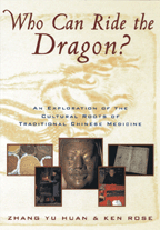We use cookies to make your experience better. To comply with the new e-Privacy directive, we need to ask for your consent to set the cookies. Learn more.
Who Can Ride The Dragon?
Who Can Ride the Dragon? presents the essence of traditional Chinese medicine so that contemporary readers can appreciate its origins, its characteristic concepts and ideas, and most importantly its relevance to contemporary health and well-being. It pays particular attention to the nature of Chinese imagery and thought, tracing a fractal pattern of lines of influence that have developed over thousands of years.
Beginning with a basic premise—that to understand traditional Chinese medical concepts, texts, theories, and methods, one must quite literally come to terms with the cultural roots of the subject—the authors explore the ways in which Chinese language has influenced the development of medical concepts and theories since ancient times. They examine folk beliefs, myths, and customs that underlie the structure of medical theory in China, and investigate the relationships that exist between Chinese religio-philosophic ideology and medical theory and practice. Subsequently, the authors examine the literary tradition in China and suggest several important ways in which literary influences have pervaded medical thinking, strategy, and practice. The richness of the scientific tradition in Chinese history and the two common venues of medical development—folk medicine and court medicine—are portrayed.
Finally, the authors sensitively elucidate the relationship between sexual culture and medical theory, based upon examination of a number of ancient texts including passages from the great Tang dynasty physician, alchemist, and sexologist,Sun Si Miao, as well as other sources.
Who Can Ride the Dragon? conveys the Chinese viewpoint of their medicine and culture. The authors write with an appreciation for and a perspective of practice and teaching in China. As they explore the deep roots of its past, readers will admire the beauty and complexity of ancient Chinese medicine and discover its relevance to modern healthcare.
This is a gem of a book and one which should be on the essential reading list of anyone studying or practising Chinese medicine, or indeed anyone with a desire to become more familiar with many aspects of traditional Chinese culture. Its range is extensive and hard to cover in a short review, managing as it does to present a bird's eye view of many key issues of Chinese language, history, culture and tradition relevant to Chinese medicine, yet offering at the same time a wealth of detail. Subjects covered include the language of Chinese medicine (with specific discussion of some of the core terms), folk beliefs, myths and customs, an overview of the three main philosophies/religions (Daoism, Chinese Buddhism and Confucianism), a discussion of the main literary classics (e.g. Yi Jing, The Art of War etc.), the history of medicine with comparison between folk medicine and court medicine and an introduction to the main medical classics, sexual practices and the cultivation of longevity and immortality, and finally a glossary with explanation of numerous key terms of Chinese medicine. Throughout the book there are numerous illustrations and quotations.
Preface
Introduction
The Language of Chinese Medicine
The Historical Context
The Nature of Nomenclature
The Basics of the Chinese Language
Problems of Translation with Possible Solutions
Folk Beliefs, Myths and Customs
The Ancient Magic World
Creation Stories
Explanation of Natural Phenomena
Life and Death
Marriage and Family Obligations
Family and Society/Microcosm and Macrocosm
Worldview
Continuity from Ancient to Contemporary Times
Food
Philosophy and Religion
Daoism
Confucianism
Chinese Buddhism
The Literary Tradition
The Yi Jing
The Yellow Emperors Classic of Internal Medicine
The Art of War
Records of the Historian
The Daoist Classics
Confucian Classics
The Scientific Tradition
Folk Medicine
Court Medicine
Overview of the Historical Development of Medicine
Sexual Culture, Longevity and Immortality
What is Sexual Culture? Three Separate Traditions of Cultivating Sexual Energy
The Relationship Between These Traditions and Medicine
Key Terms of Traditional Chinese Medicine
Taxonomy of the Nomenclature
Traditional Categories
Rethinking These Categories in Western Terms
Words Listed by Category with Translations, Interpretations and Explanations
Index
Bibliography
Appendices
| Summary | Zhang Yu Huan & Ken Rose Paradigm, 2000 272 pages Paperback |
|---|---|
| Author | Zhang Yu Huan & Ken Rose |
| Publication Date | 1 Jan 1970 |
| Publisher | Paradigm Press |
| Number of Pages | 272 |
| Book Format | Softback |
* Orders shipped outside of Europe are eligible for VAT relief and will not be charged VAT.



